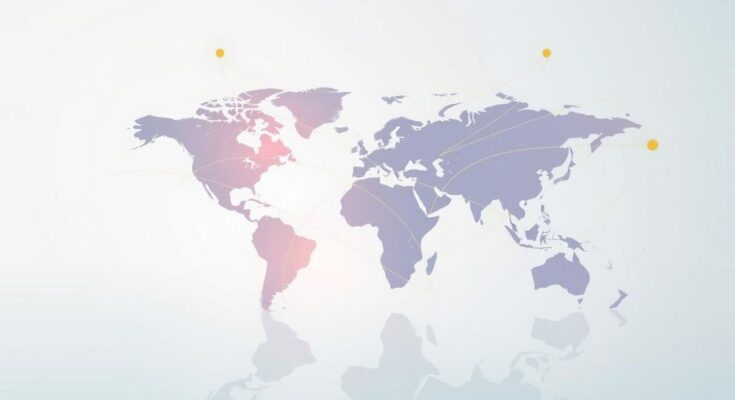Steve Witkoff, Trump’s Middle East envoy, visited Israel to promote diplomatic efforts following a ceasefire in Gaza. He is set to meet with Israeli leaders and engage with Gulf states on postwar reconstruction, while Senate Republicans’ proposed sanctions on the ICC face opposition. Amidst ongoing conflict, finding a sustainable resolution for Palestinians through a two-state solution is emphasized as critical.
On Wednesday, Steve Witkoff, President Donald Trump’s Middle East envoy, was in Israel and planned to visit Gaza, which has sustained a ceasefire between Hamas and Israel lasting over a week. Reports indicate Witkoff is scheduled to meet with Prime Minister Benjamin Netanyahu and other senior Israeli officials. Additionally, President Trump has invited Netanyahu to the White House next week, marking him as the first foreign leader welcomed during Trump’s second term.
The Trump administration is actively pursuing diplomatic engagements in the region, as Witkoff seeks to engage with key leaders. He recently spoke with Qatar and Egyptian officials, and had conversations with Jordan’s King Abdullah II, aiming to enhance cooperation amidst the ongoing discussions around the Middle East conflict. Witkoff’s efforts are critical as the administration attempts to stabilize the ceasefire and promote future negotiations.
In related legislative news, Senate Republicans were unable to advance a bill aimed at sanctioning the International Criminal Court (ICC) after facing opposition from Democrats and warnings from European allies regarding its potential negative impact. The failed legislation was a response to the ICC’s charges against Israeli and Hamas leaders for alleged war crimes during the Gaza conflict. Although this bill passed the House, it did not secure the necessary support in the Senate.
Opponents of the GOP-led sanctions bill raised concerns over its overreaching implications, as it proposed sanctions against anyone implicated in ICC investigations regarding American and allied conduct. European diplomats voiced their worries that such sanctions could undermine international law, crucial for global order and security.
Currently, the U.S. administration is seeking broader engagement in Middle Eastern affairs, particularly regarding the ceasefire’s reinforcement and potential reconstruction efforts in Gaza. Witkoff has begun discussions with Persian Gulf states like Saudi Arabia, which could play a substantial role in Gaza’s reconstruction. However, these nations are keen on ensuring a pathway toward establishing a Palestinian state as part of any postwar framework.
Qatar’s Foreign Ministry spokesman highlighted the necessity of a two-state solution as vital for resolving the Palestinian issue. Meanwhile, President Trump suggested controversial measures regarding the Gaza population, advocating for a substantial transformation of the territory. He described Gaza as devastated and called for decisive action to address the ongoing humanitarian situation.
The U.S. administration’s involvement in Middle Eastern diplomacy is crucial as ongoing conflicts, particularly between Israel and Hamas, have significant implications for regional stability. The recent ceasefire efforts in Gaza provide an opportunity for diplomatic initiatives that could address reconstruction needs and promote broader normalization of relations in the region. Additionally, legislative responses to international judicial actions reflect the complexities surrounding U.S. foreign policy, especially concerning allies like Israel. As the Trump administration intensifies its diplomatic outreach, the involvement of Gulf nations becomes essential, both for financial backing for reconstruction and for leveraging support for a sustainable resolution to the Palestinian conflict. The proposed legislation against the ICC also underscores the contentious discussions about accountability in international relations, particularly concerning war-related conduct. Overall, the situation in the Middle East remains dynamic, requiring careful navigation of diplomatic relations and legislative actions to maintain peace and support humanitarian efforts.
In summary, Steve Witkoff’s visit to Israel and planned trip to Gaza are part of a broader strategy by the Trump administration to strengthen diplomatic efforts in the Middle East amidst the ceasefire. Legislative challenges surrounding the ICC indicate the ongoing tensions regarding accountability and international law, while the potential involvement of Gulf states in Gaza reconstruction underscores the need for a collaborative approach. The emphasis on a two-state solution remains pivotal for a sustainable path forward in resolving the Palestinian issue.
Original Source: www.washingtonpost.com




